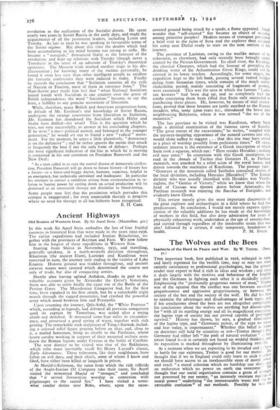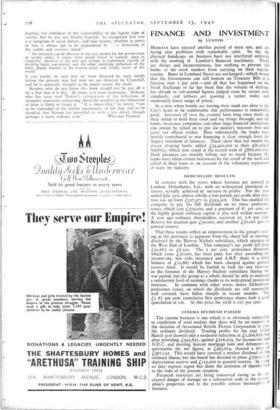The Wolves and the Bees
Tats important book, first published in 1916, enlarged in 1919, and lately reprinted for the twelfth time, may or may not seem entirely satisfactory to professional psychologists, but the general reader may expect to find it rich in ideas and wisdom • and since it deals largely with the motives and behaviour of the English and the Germans in fighting each other it is decidedly topical. Emphasising the " profoundly gregarious nature of man," Trotter was of the opinion that the conflict was one between socialised gregariousness and aggressive gregariousness, or between the society of the bee and the society of the wolf. He did his best to examine the advantages and disadvantages of both types, and if his conclusions about the bees are not altogether complacent, his conclusions about the wolves are anything but discouraging, for "with all its startling energy and all its magnificent enterprise. the lupine type of society has not proved capable of prolonged survival." History has shown, he says, a gradual elimination of the lupine type, and " Germanic power, of the type we know and fear today, is impermanent." Whether this belief is based on doctrines still held by scientists or not—Trotter thought that Germany had either left " the path of natural evolution " or had never found it—it is certainly not based on wishful thinking, and its exposition is marked throughout by illuminating rem:Irks.
At a moment when we are expecting to be invaded and to have to battle for our existence, Trotter is good for our moralL. He thought that if we in England could only learn to stick to ether we should have access to an inexhaustible store of moral Power, and reach " a moral cohesion which no hardship can shal:e
an endurance which no power on earth can overcome. He thought that our social organisation contains a germ of strenF", not possessed by our enemy, "an intensely resistant nueeus moral power " underlying "the immeasurable waste and the
in- extricable confusion" of our methods. Possibly he was too
hopeful, too confident of the vulnerability of the lupine type of society, but he was not blindly hopeful : he recognised that war is a symptom of social defects, and that victory, whether in peace or war, is always apt to be jeopardised by " dominion of the stable and resistive mind."
" No direction can be effective in the way needed for the preservation of society unless it comes from minds broad in outlook, deep in sympathy, sensitive to the new and strange in experience, capable of resisting habit, convention, and the other sterilising influences of the herd, deeply learned in the human mind and vividly aware of the It can hardly be said that we were directed by such minds before the present war, but now we are directed by Churchill, and he is generally thought to be much nearer the mark.
Readers who do not know this book should not be put off it by a fear that it is dry. At times it is even humorous. Nobody who has once read Trotter's comparison of the behaviour of strangers cautiously conversing about the weather to the behaviour of dogs is likely to forget it. " It is impossible," he wrote, " not to be reminded of the similar manoeuvres of the dog, and to be thankful that Nature has provided us with a less direct, though perhaps a more tedious, code " WILLIAM PLOMER.



























 Previous page
Previous page